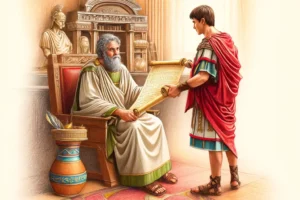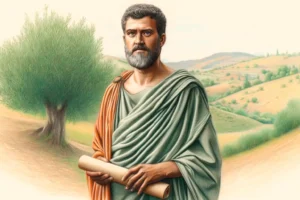
Timothy: Close Companion and Disciple of Paul, Recipient of Two Epistles
Timothy was a close companion and disciple of the Apostle Paul. He is well-known for being the recipient of two epistles, 1 Timothy and 2 Timothy, which offer guidance on church leadership, sound doctrine, and personal conduct.
Quick Facts:
- Background: Timothy was the son of a Jewish mother, Eunice, and a Greek father.
- Early Faith: He was taught the Scriptures from a young age by his mother and grandmother, Lois.
- Paul’s Protégé: Paul met Timothy in Lystra and was impressed by his faith and reputation.
- Circumcision: Paul circumcised Timothy to respect Jewish customs and to facilitate their mission work.
- Missionary Work: Timothy accompanied Paul on his second and third missionary journeys.
- Church Leadership: Paul entrusted Timothy with leadership roles in the churches at Ephesus and other locations.
- First Epistle: 1 Timothy addresses church organization, qualifications for leaders, and Timothy’s personal conduct.
- Second Epistle: 2 Timothy focuses on endurance, sound teaching, and personal advice as Paul nears the end of his life.
- Mentioned in Epistles: Timothy is mentioned in several of Paul’s other letters, highlighting his importance.
- Legacy: Timothy is remembered for his faithfulness, leadership, and dedication to the early Christian church.
Background and Early Faith
Timothy’s background is notable for his mixed heritage, being the son of a Jewish mother, Eunice, and a Greek father (Acts 16:1). His faith was nurtured from a young age by his mother and grandmother, Lois, who taught him the Scriptures (2 Timothy 1:5). This strong foundation in the Jewish faith prepared Timothy for his future role in the early Christian church.
Encounter with Paul
Paul first met Timothy during his second missionary journey in Lystra (Acts 16:1-3). Impressed by Timothy’s reputation among the believers, Paul decided to take him along on his travels. To avoid potential conflicts with Jewish communities, Paul circumcised Timothy, demonstrating their respect for Jewish customs despite their mission to the Gentiles.
Role in Missionary Journeys
Timothy became one of Paul’s most trusted companions, joining him on his second and third missionary journeys. He played a significant role in spreading the Gospel and establishing churches throughout the Roman Empire. Timothy’s involvement in these journeys is documented in various New Testament passages, highlighting his dedication and service (Acts 17:14-15; 18:5; 19:22).
Church Leadership and Challenges
Paul entrusted Timothy with significant leadership responsibilities, particularly in Ephesus, where Timothy was tasked with overseeing the church and addressing false teachings (1 Timothy 1:3-4). His leadership roles required him to navigate complex issues within the early Christian communities, balancing doctrinal integrity with pastoral care.
First Epistle to Timothy
In 1 Timothy, Paul provides Timothy with guidance on church organization, including qualifications for overseers and deacons (1 Timothy 3:1-13). The letter also addresses issues of false doctrine, proper worship, and the treatment of various groups within the church. Paul’s instructions emphasize the importance of sound teaching and godly conduct.
Second Epistle to Timothy
2 Timothy is a more personal and urgent letter, written by Paul as he faced imminent execution. Paul encourages Timothy to remain steadfast in his faith, endure suffering, and continue preaching the Gospel (2 Timothy 4:1-5). The epistle reflects Paul’s deep affection for Timothy and his desire for Timothy to carry on his mission.
Timothy in Paul’s Other Epistles
Timothy is mentioned in several of Paul’s other letters, including Romans, 1 and 2 Corinthians, Philippians, Colossians, and 1 and 2 Thessalonians. These references underscore Timothy’s integral role in Paul’s ministry and his widespread influence in the early church.
Legacy and Theological Significance
Timothy’s legacy is one of faithfulness, humility, and dedication. His close relationship with Paul and his leadership in the early church serve as a model for Christian discipleship and ministry. The epistles addressed to him provide valuable insights into church governance, pastoral care, and personal conduct, continuing to guide Christian leaders today.
In conclusion, Timothy was a pivotal figure in the New Testament, whose contributions to the early church were significant and far-reaching. His story illustrates the impact of mentorship, the importance of sound doctrine, and the enduring call to faithful service in the Christian community.



